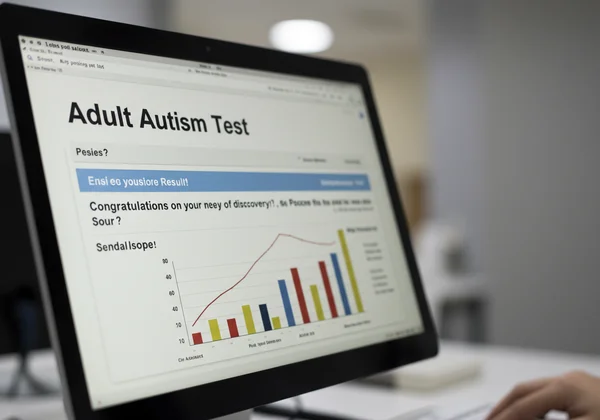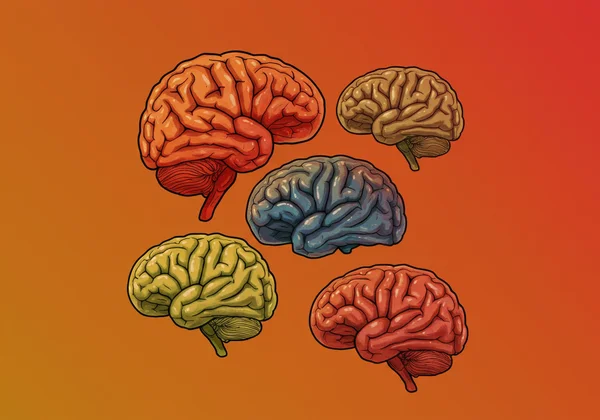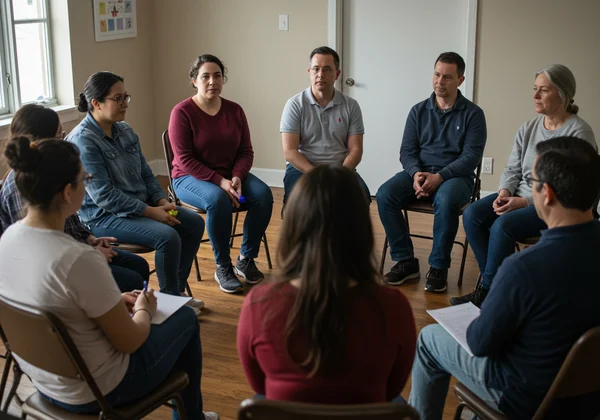การวินิจฉัยภาวะออทิสติกในผู้ใหญ่: 7 ขั้นตอนแรกและคู่มือสนับสนุน
September 2, 2025 | By Seraphina Rivers
ขอแสดงความยินดีกับการเริ่มต้นการเดินทางเพื่อค้นพบตัวเอง ไม่ว่าคุณเพิ่งจะได้รับการ วินิจฉัยภาวะออทิสติกในผู้ใหญ่ อย่างเป็นทางการ หรือได้คะแนนสูงจากการคัดกรองออนไลน์ ก็เป็นเรื่องปกติที่จะรู้สึกโล่งใจ สับสน และมีความหวังไปพร้อมๆ กัน คุณอาจกำลังถามตัวเองว่า ฉันควรทำอย่างไรหลังจากได้คะแนนสูงจากการทดสอบออทิสติกออนไลน์? คู่มือนี้พร้อมที่จะนำเสนอแนวทางที่เข้าอกเข้าใจและนำไปใช้ได้จริง เพื่อช่วยให้คุณก้าวผ่านบทใหม่นี้ด้วยความชัดเจนและความมั่นใจ
ความเข้าใจที่เพิ่งค้นพบนี้เป็นเครื่องมือที่ทรงพลัง ไม่ใช่จุดสิ้นสุด แต่เป็นการเริ่มต้น – เลนส์ใหม่ที่คุณจะใช้มองอดีต ปัจจุบัน และอนาคตของคุณ สำหรับหลายคน นี่คือจุดเริ่มต้นของการใช้ชีวิตอย่างเป็นตัวของตัวเองมากขึ้น หากคุณเพิ่งเริ่มสำรวจความเป็นไปได้นี้ การทดสอบออทิสติกออนไลน์ ที่น่าเชื่อถือสามารถเป็นขั้นตอนแรกที่มีคุณค่าในการรวบรวมข้อมูลเบื้องต้นก่อนขอคำแนะนำจากผู้เชี่ยวชาญ

การยอมรับการวินิจฉัยภาวะออทิสติกในผู้ใหญ่ของคุณ
ขั้นตอนแรกและสำคัญที่สุดคือการเปลี่ยนแปลงภายใน ซึ่งเกี่ยวข้องกับการปรับเปลี่ยนมุมมองและให้พื้นที่ตัวเองในการประมวลผลว่าข้อมูลใหม่นี้มีความหมายต่อคุณอย่างไร ช่วงเวลานี้เป็นเรื่องของความเข้าใจและความเห็นอกเห็นใจ โดยเฉพาะอย่างยิ่งต่อตัวคุณเอง ผู้ใหญ่หลายคนที่ เพิ่งได้รับการวินิจฉัยว่าเป็นออทิสติก พบว่าความรู้นี้ช่วยให้มองเห็นภาพรวมใหม่ของประสบการณ์ตลอดชีวิตของพวกเขา
ทำความเข้าใจการยอมรับตนเองและความหลากหลายทางระบบประสาท
การเดินทางของคุณเริ่มต้นด้วยการยอมรับแนวคิดเรื่องความหลากหลายทางระบบประสาท นี่คือแนวคิดที่ว่าความแตกต่างของสมอง เช่น ภาวะออทิสติก เป็นความแตกต่างตามธรรมชาติในพันธุกรรมของมนุษย์ ไม่ใช่ข้อบกพร่องที่ต้องแก้ไข การมองเห็นตัวเองผ่านเลนส์นี้ส่งเสริม การยอมรับตนเอง แทนที่จะมุ่งเน้นไปที่ความท้าทาย คุณสามารถเริ่มตระหนักถึงจุดแข็งที่เป็นเอกลักษณ์ที่มาพร้อมกับลักษณะทางระบบประสาทของคุณ เช่น การจดจ่ออย่างลึกซึ้ง การจดจำรูปแบบ และความรู้สึกยุติธรรมที่แข็งแกร่ง
การเรียนรู้เกี่ยวกับความหลากหลายทางระบบประสาทช่วยให้คุณหลีกหนีจากแรงกดดันทางสังคมที่ต้องการให้เป็น 'ปกติ' และส่งเสริมให้คุณยอมรับและเฉลิมฉลองความเป็นตัวตนที่แท้จริง นี่คือการเปลี่ยนแปลงที่ลึกซึ้งที่ช่วยให้คุณสร้างชีวิตที่เหมาะกับตัวตนของคุณอย่างแท้จริง แทนที่จะพยายามปรับตัวให้เข้ากับโลกที่ไม่ได้ออกแบบมาเพื่อคุณ

การประมวลผลอารมณ์: ความโล่งใจ ความโศกเศร้า และการเปลี่ยนแปลงตัวตน
การได้รับการวินิจฉัยภาวะออทิสติกในวัยผู้ใหญ่มักจะกระตุ้นคลื่นอารมณ์ที่ซับซ้อน คุณอาจรู้สึกโล่งใจอย่างมาก – ความรู้สึกที่ได้รับการยืนยันว่าสิ่งที่คุณรู้สึกมานั้นถูกต้องและมีเหตุผล การยืนยันนี้สามารถเยียวยาได้อย่างเหลือเชื่อ
ในขณะเดียวกัน ก็เป็นเรื่องปกติที่จะรู้สึกโศกเศร้า คุณอาจโศกเศร้ากับปีที่ต้องดิ้นรนโดยไม่เข้าใจ กับโอกาสที่พลาดไป หรือกับบุคคลที่คุณพยายามอย่างหนักที่จะเป็น อนุญาตให้ตัวเองรู้สึกทั้งหมดโดยปราศจากการตัดสิน การประมวลผลทางอารมณ์ นี้เป็นส่วนสำคัญในการรวมการวินิจฉัยของคุณเข้ากับตัวตนของคุณ ความเข้าใจในตัวตนของคุณกำลังขยายตัว และนั่นคือการเดินทางที่สมควรได้รับความอดทนและความเมตตา
การสร้างระบบสนับสนุนและชุมชนของคุณ
คุณไม่จำเป็นต้องเดินทางนี้เพียงลำพัง การเชื่อมโยงกับผู้อื่นที่มีประสบการณ์คล้ายกันเป็นหนึ่งในขั้นตอนที่ทรงพลังที่สุดที่คุณสามารถทำได้ การค้นหาชุมชนของคุณช่วยยืนยันตัวตน ลดความรู้สึกโดดเดี่ยว และให้ การสนับสนุนภาวะออทิสติกสำหรับผู้ใหญ่ ที่เป็นประโยชน์
การเชื่อมโยงกับผู้ใหญ่ที่เป็นออทิสติกคนอื่นๆ และกลุ่มสนับสนุน
การค้นหาชุมชนของคุณสามารถเปลี่ยนแปลงชีวิตได้ มองหาฟอรัมออนไลน์ กลุ่มโซเชียลมีเดีย และการรวมตัวในท้องถิ่นสำหรับผู้ใหญ่ที่เป็นออทิสติก แพลตฟอร์มเช่น Autistic Self Advocacy Network (ASAN) หรือสมาคมออทิสติกในท้องถิ่นมักจะมีแหล่งข้อมูลเพื่อช่วยให้คุณเชื่อมโยงกับ ชุมชนออทิสติก การได้ยินจากผู้อื่นที่เข้าใจโดยที่คุณไม่จำเป็นต้องอธิบายตัวเองเป็นประสบการณ์ที่ยืนยันตัวตนได้อย่างเหลือเชื่อ
กลุ่มเหล่านี้เป็นแหล่งความรู้ที่ยอดเยี่ยม ตั้งแต่กลยุทธ์การรับมือกับภาวะรับความรู้สึกมากเกินไป ไปจนถึงเคล็ดลับในการจัดการสถานการณ์ทางสังคม ความสนิทสนมและความเข้าใจซึ่งกันและกันสามารถเป็นสิ่งเยียวยาที่ทรงพลังสำหรับชีวิตที่รู้สึกไม่เข้าใจมาตลอด หากคุณเพิ่งเริ่มต้นกระบวนการนี้ การทำ การคัดกรองออทิสติกฟรี สามารถให้ความชัดเจนที่จำเป็นในการก้าวไปสู่ขั้นตอนต่อไปนี้

การสื่อสารกับคนที่คุณรักเกี่ยวกับการวินิจฉัยของคุณ
การตัดสินใจว่าจะบอกใครและบอกอย่างไรเป็นทางเลือกส่วนบุคคล เมื่อคุณพร้อม ให้คิดถึงสิ่งที่คุณต้องการให้ผู้อื่นเข้าใจ คุณอาจอธิบายว่านี่ไม่ใช่การพัฒนาใหม่ แต่เป็นความเข้าใจใหม่เกี่ยวกับตัวตนของคุณมาโดยตลอด การใช้ กลยุทธ์การสื่อสาร ที่ชัดเจนเป็นสิ่งสำคัญ
คุณสามารถแบ่งปันบทความหรือวิดีโอเกี่ยวกับภาวะออทิสติกในผู้ใหญ่ที่สอดคล้องกับประสบการณ์ของคุณ เตรียมพร้อมสำหรับปฏิกิริยาที่หลากหลาย – บางคนจะให้การสนับสนุนทันที ในขณะที่คนอื่นๆ อาจต้องใช้เวลาทำความเข้าใจ เป้าหมายคือการช่วยให้พวกเขาเห็นว่าการวินิจฉัยนี้ช่วยให้คุณเข้าใจและดูแลตัวเองได้ดีขึ้น ซึ่งท้ายที่สุดจะเสริมสร้างความสัมพันธ์ของคุณ
ขั้นตอนปฏิบัติสำหรับชีวิตหลังผลการทดสอบออทิสติก
ด้วยความเข้าใจใหม่มาพร้อมกับโอกาสในการเปลี่ยนแปลงเชิงปฏิบัติและเชิงบวกในชีวิตประจำวันของคุณ คำถามที่ว่า ควรทำอย่างไรหลังการวินิจฉัยภาวะออทิสติก สามารถตอบได้ด้วยการนำกลยุทธ์ที่สนับสนุนความเป็นอยู่ที่ดีของคุณและช่วยให้คุณใช้ชีวิตได้อย่างเต็มศักยภาพ
การสำรวจการปรับที่ทำงานและการศึกษา
การเข้าใจสิทธิของคุณเป็นการเสริมพลัง สถานที่ทำงานและสถาบันการศึกษาหลายแห่งมีข้อกำหนดทางกฎหมายที่ต้องจัดหาการปรับที่เหมาะสม สิ่งเหล่านี้ไม่ใช่สิทธิพิเศษ แต่เป็นการปรับเปลี่ยนที่สร้างสภาพแวดล้อมที่เอื้อต่อการประสบความสำเร็จอย่างเท่าเทียม
ตัวอย่างของ การปรับที่ทำงาน อาจรวมถึงหูฟังตัดเสียงรบกวนเพื่อจัดการกับสิ่งกระตุ้นทางประสาทสัมผัส การรับคำแนะนำเป็นลายลักษณ์อักษรแทนการพูด หรือการมีตารางเวลาที่ยืดหยุ่นมากขึ้น เริ่มต้นด้วยการระบุความต้องการเฉพาะของคุณ จากนั้นสำรวจว่ามีทางเลือกใดบ้าง สิ่งนี้สามารถลดความเครียดได้อย่างมากและปรับปรุงประสิทธิภาพและความเป็นอยู่ที่ดีโดยรวมของคุณ

การขอคำแนะนำจากผู้เชี่ยวชาญ (การบำบัด, การโค้ช, การให้คำปรึกษา)
การเชื่อมโยงกับนักบำบัดหรือโค้ชที่เชี่ยวชาญด้านภาวะออทิสติกในผู้ใหญ่สามารถเป็นประโยชน์อย่างเหลือเชื่อ พวกเขาสามารถให้ คำแนะนำจากผู้เชี่ยวชาญ ที่ปรับให้เหมาะกับประสบการณ์เฉพาะของคุณ การบำบัดสามารถช่วยคุณประมวลผลแง่มุมทางอารมณ์ของการวินิจฉัย พัฒนากลยุทธ์การรับมือกับความวิตกกังวลหรือปัญหาด้านประสาทสัมผัส และฝึกฝนทักษะทางสังคมหรือทักษะการบริหารจัดการตนเองในสภาพแวดล้อมที่สนับสนุน
มองหาผู้เชี่ยวชาญที่มีแนวทางที่สนับสนุนความหลากหลายทางระบบประสาท พวกเขาจะมุ่งเน้นไปที่การใช้ประโยชน์จากจุดแข็งของคุณและสร้างชีวิตที่เหมาะกับคุณ แทนที่จะพยายามทำให้คุณดูเหมือนคนทั่วไปมากขึ้น การ คัดกรองออนไลน์ เป็นเอกสารที่ดีที่จะนำไปปรึกษาผู้เชี่ยวชาญเพื่อเริ่มต้นการพูดคุย
การทำความเข้าใจและปรับตัวให้เข้ากับลักษณะทางประสาทสัมผัสของคุณ
บุคคลออทิสติกหลายคนมี ลักษณะทางประสาทสัมผัส ที่เป็นเอกลักษณ์ ซึ่งหมายความว่าคุณอาจไวต่อสิ่งกระตุ้นมากเกินไป (hyper) หรือไวต่อสิ่งกระตุ้นน้อยเกินไป (hypo) ในสิ่งต่างๆ เช่น แสง เสียง สัมผัส หรือกลิ่น การทำความเข้าใจความไวเฉพาะของคุณเป็นขั้นตอนแรกสู่การจัดการ
ตัวอย่างเช่น หากคุณไวต่อแสงจ้า การสวมแว่นกันแดดในอาคารหรือใช้หลอดไฟหรี่แสงสามารถช่วยได้ หากคุณไวต่อเสียง หูฟังตัดเสียงรบกวนสามารถช่วยชีวิตได้ ในทางกลับกัน หากคุณไวต่อสิ่งกระตุ้นน้อยเกินไป คุณอาจแสวงหาการกระตุ้นทางประสาทสัมผัสที่เข้มข้น เช่น การใช้ผ้าห่มถ่วงน้ำหนักเพื่อกดทับอย่างลึกซึ้ง การสร้างสภาพแวดล้อมที่เป็นมิตรต่อประสาทสัมผัสทั้งที่บ้านและที่ทำงานสามารถปรับปรุงคุณภาพชีวิตของคุณได้อย่างมาก
ขณะที่คุณเดินทางต่อไปพร้อมกับการวินิจฉัยภาวะออทิสติกในผู้ใหญ่ โปรดจำไว้ว่านี่คือเส้นทางแห่งการค้นพบส่วนบุคคลและต่อเนื่อง การยอมรับตนเอง การสร้างระบบสนับสนุนที่แข็งแกร่ง และการดำเนินการตามขั้นตอนที่นำไปปฏิบัติได้จริงเพื่อตอบสนองความต้องการของคุณเป็นสิ่งสำคัญสำหรับการใช้ชีวิตที่มีพลังและเป็นตัวของตัวเองมากขึ้น ความรู้นี้เป็นกุญแจที่ไขสู่ความเข้าใจที่ลึกซึ้งยิ่งขึ้นเกี่ยวกับตัวคุณเอง
โปรดจำไว้ว่า เครื่องมือบนเว็บไซต์ของเราออกแบบมาเพื่อให้ข้อมูลเชิงลึกเบื้องต้น ไม่ใช่การวินิจฉัยอย่างเป็นทางการ สิ่งเหล่านี้เป็นจุดเริ่มต้น ใช้ข้อมูลที่คุณได้รับจากการ ทดสอบออทิสติกฟรี เป็นแรงผลักดันในการเชื่อมโยงกับผู้เชี่ยวชาญที่มีคุณสมบัติซึ่งสามารถให้คำแนะนำและการสนับสนุนที่ปรับให้เหมาะกับคุณ การเดินทางของคุณมีความหมายและได้รับการยอมรับ และคุณมีชุมชนทั้งหมดรอคอยที่จะต้อนรับคุณ
คำถามที่พบบ่อยเกี่ยวกับภาวะออทิสติกในผู้ใหญ่และขั้นตอนต่อไป
ฉันควรทำอย่างไรหลังจากได้คะแนนสูงจากการทดสอบออทิสติกออนไลน์?
คะแนนสูงบ่งชี้ว่าคุณมีลักษณะที่เกี่ยวข้องกับภาวะออทิสติกสเปกตรัมโดยทั่วไป ขั้นตอนต่อไปที่สำคัญที่สุดคือการปรึกษาผู้เชี่ยวชาญด้านสุขภาพที่มีคุณสมบัติ เช่น นักจิตวิทยาหรือจิตแพทย์ที่เชี่ยวชาญด้านภาวะออทิสติกในผู้ใหญ่ เพื่อการประเมินที่ครอบคลุม เครื่องมือออนไลน์คือการคัดกรอง ไม่ใช่การวินิจฉัย ใช้ผลลัพธ์ของคุณจากการ ทดสอบออทิสติกออนไลน์ ของเราเป็นจุดเริ่มต้นสำหรับการพูดคุยกับผู้เชี่ยวชาญ
คุณสามารถวินิจฉัยภาวะออทิสติกด้วยตนเองโดยอาศัยแหล่งข้อมูลออนไลน์ได้หรือไม่?
แม้ว่าการวินิจฉัยตนเองจะเป็นส่วนสำคัญของกระบวนการค้นพบตนเองสำหรับหลายๆ คนในชุมชนออทิสติก แต่มันไม่ใช่การวินิจฉัยทางการแพทย์อย่างเป็นทางการ แหล่งข้อมูลและแบบทดสอบออนไลน์สามารถให้ข้อมูลเชิงลึกที่มีคุณค่า แต่ก็ไม่สามารถทดแทนการประเมินอย่างละเอียดจากผู้เชี่ยวชาญที่ได้รับการฝึกฝนได้ การวินิจฉัยอย่างเป็นทางการมักจำเป็นสำหรับการเข้าถึงการคุ้มครองทางกฎหมายและการอำนวยความสะดวกในการทำงาน
ฉันจะได้รับการทดสอบภาวะออทิสติกจากผู้เชี่ยวชาญในฐานะผู้ใหญ่ได้อย่างไร?
เริ่มต้นด้วยการพูดคุยกับแพทย์เวชปฏิบัติทั่วไปของคุณ ซึ่งสามารถส่งต่อคุณไปยังผู้เชี่ยวชาญได้ คุณยังสามารถค้นหานักจิตวิทยาหรือคลินิกที่เชี่ยวชาญด้านการประเมินพัฒนาการทางสมองและระบบประสาทในผู้ใหญ่ได้โดยตรง กระบวนการนี้โดยทั่วไปเกี่ยวข้องกับการสัมภาษณ์เกี่ยวกับประวัติพัฒนาการของคุณ แบบสอบถาม และการสังเกตโดยตรง
คะแนนสูงในการทดสอบออทิสติกหมายถึงอะไร?
คะแนนสูงในการคัดกรอง เช่น แบบทดสอบ Autism Quotient (AQ) บ่งชี้ว่าคุณแสดงลักษณะที่บ่งชี้ถึงภาวะออทิสติกอย่างชัดเจน ซึ่งบ่งชี้ว่าการเข้ารับการประเมินอย่างเป็นทางการอาจเป็นประโยชน์ต่อความเข้าใจในตนเองของคุณ ซึ่งไม่ได้ยืนยันว่าคุณเป็นออทิสติก แต่เป็นสัญญาณที่ชัดเจนว่าการประเมินโดยผู้เชี่ยวชาญเพิ่มเติมเป็นขั้นตอนต่อไปที่มีเหตุผลและมักจะเป็นประโยชน์ คุณสามารถ เริ่มต้นการคัดกรองของคุณ ได้ที่หน้าแรกของเรา